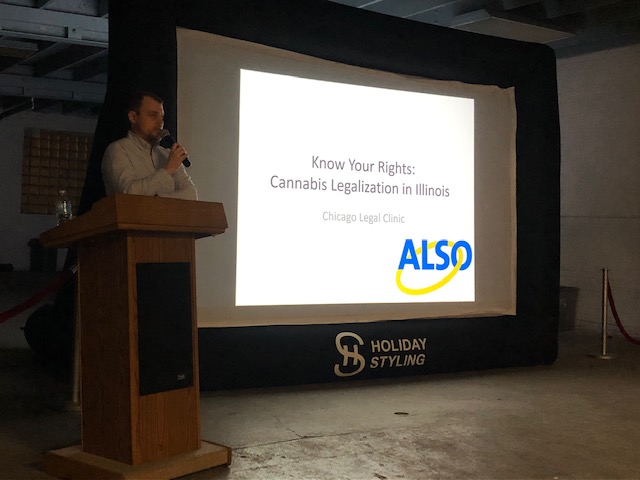Know Your Rights: Cannabis Legalization in Illinois
Changes in cannabis legalization laws in Illinois that took effect on January 1 have led to many questions about what Illinois residents need to know about getting records expunged as well as the purchase, sale and growth of cannabis in the state. On February 19, ALSO hosted a free and open-to-the-public workshop in West Humboldt Park to address a range of issues. “Know Your Rights: Cannabis Legalization in Illinois” was held at ALSO’s Chicago Avenue site in Chicago.
Starting on January 1, 2020, it became legal in Illinois to buy cannabis from licensed sellers if you are over 21, with or without a medical marijuana card; sell cannabis if you get a state license, and grow cannabis if you have a medical marijuana prescription or a commercial growing license. Illinois became the 11th state to legalize recreational marijuana.
Cannabis possession limits in Illinois are:
30 grams of cannabis flower;
5 grams of cannabis concentrate; and
No more than 500 milligrams of THC contained in a cannabis infused product.
ALSO is partnering with the Chicago Legal Clinic, Inc., to provide legal services, including expungement of cannabis-related arrests, charges, and convictions. In Cook County, the Chicago Legal Clinic is among the organizations that can work with clients on expungement cases.

Drew Curle, Managing Attorney at Chicago Legal Clinic, presented information and answered questions at the workshop, explaining that cannabis legalization authorized two types of relief concerning the expungement of cannabis-related criminal records – automatic expungement and discretionary expungement.
For those who have automatic expungement cases, the Illinois Prisoner Review Board (PRB) reviews your case to determine if it meets certain requirements: (1) that your case is a non-conviction, or (2) is a conviction for possession or manufacture/delivery of 30 grams or less of cannabis that is not associated with a violent crime. If your case meets these criteria, the PRB will recommend that the Governor pardon it. The Governor may then issue a pardon; if that happens, the state Attorney General will file a petition to expunge the record, and notify you.
Be aware that while automatic expungement may be an option for some people, there is a waiting period involved, and in some cases, it is significant.
- For those arrested on January 1, 2013 or later, records will be expunged by January 1, 2021.
- For those who were arrested between January 1, 2000 and December 31, 2012, records will be expunged by January 1, 2023.
- For those arrested before January 1, 2000, records will be expunged by January 1, 2025.
Discretionary expungement means that your case will not be automatically expunged. You will have to petition the Illinois court you were convicted in to ask for expungement of that case. If the judge grants your petition, the conviction will be vacated and expunged. Discretionary expungement is available for convictions of 30 to 500 grams that involve possession or delivery, as long as it was not associated with a violent crime.
One option for people who may be eligible for automatic expungement is to pursue discretionary expungement as a potentially faster alternative. This may allow individuals to avoid the waiting periods for automatic expungement.
Curle also noted that the new law does not allow cannabis use everywhere, and it is still prohibited in certain places, just as there are for tobacco smoking and alcohol consumption. For example, cannabis cannot be consumed in Illinois in public places (except for dispensaries, if they allow it), while driving, or while near anyone under the age of 21. It is also not permitted on school grounds or any other place where tobacco smoking is not allowed. In addition, landlords can ban cannabis use by their tenants. Non-citizens should not consume cannabis in Illinois, as it is still illegal at the federal level and could lead to deportation or other immigration issues.
Chicago Legal Clinic currently provides free consultation and representation in expungement and sealing cases through ALSO’s legal services program. Consultation and representation are also available on a range of other issues, including child support and custody, landlord/tenant disputes, food stamps, and immigration.
You can view the slides from the Cannabis Legalization Workshop here.
RECAP
Changes in cannabis legalization laws in Illinois that took effect on January 1 have led to many questions about what Illinois residents need to know about getting records expunged as well as the purchase, sale and growth of cannabis in the state. On February 19, ALSO hosted a free and open-to-the-public workshop in West Humboldt Park to address a range of issues. “Know Your Rights: Cannabis Legalization in Illinois” was held at ALSO’s Chicago Avenue site in Chicago.
ALSO is partnering with the Chicago Legal Clinic, Inc., to provide legal services, including expungement of cannabis-related arrests, charges, and convictions. In Cook County, the Chicago Legal Clinic is among the organizations that can work with clients on expungement cases.
Cannabis legalization authorized two types of relief concerning the expungement of cannabis-related criminal records – automatic expungement and discretionary expungement.
One option for people who may be eligible for automatic expungement is to pursue discretionary expungement as a potentially faster alternative. This may allow individuals to avoid the waiting periods for automatic expungement.
ALSO is an organization committed to ending violence in homes and communities nationwide. Your contribution will help us live out our mission to develop, promote and implement model programs in order to build a movement for peace and safety in the coming year.
With your support, we will:
- Continue providing jobs for in-risk youth through our 10-10-10 job training program.
- Provide bystander intervention training for youth and community members, giving people the skills to know how to increase safety in high risk situations.
- Explore and reveal the relationship between intimate partner and community violence to create programming that will reduce both.

